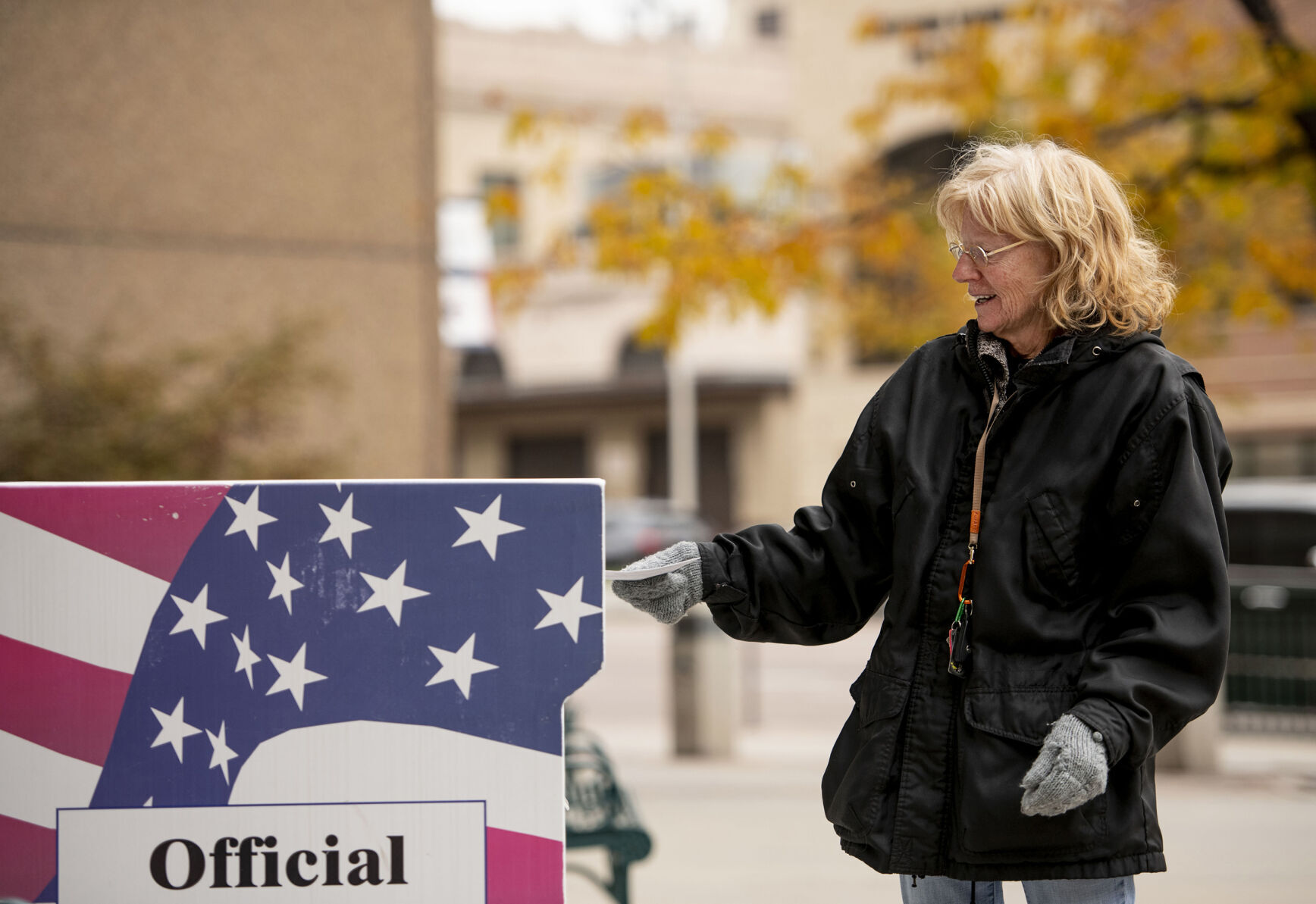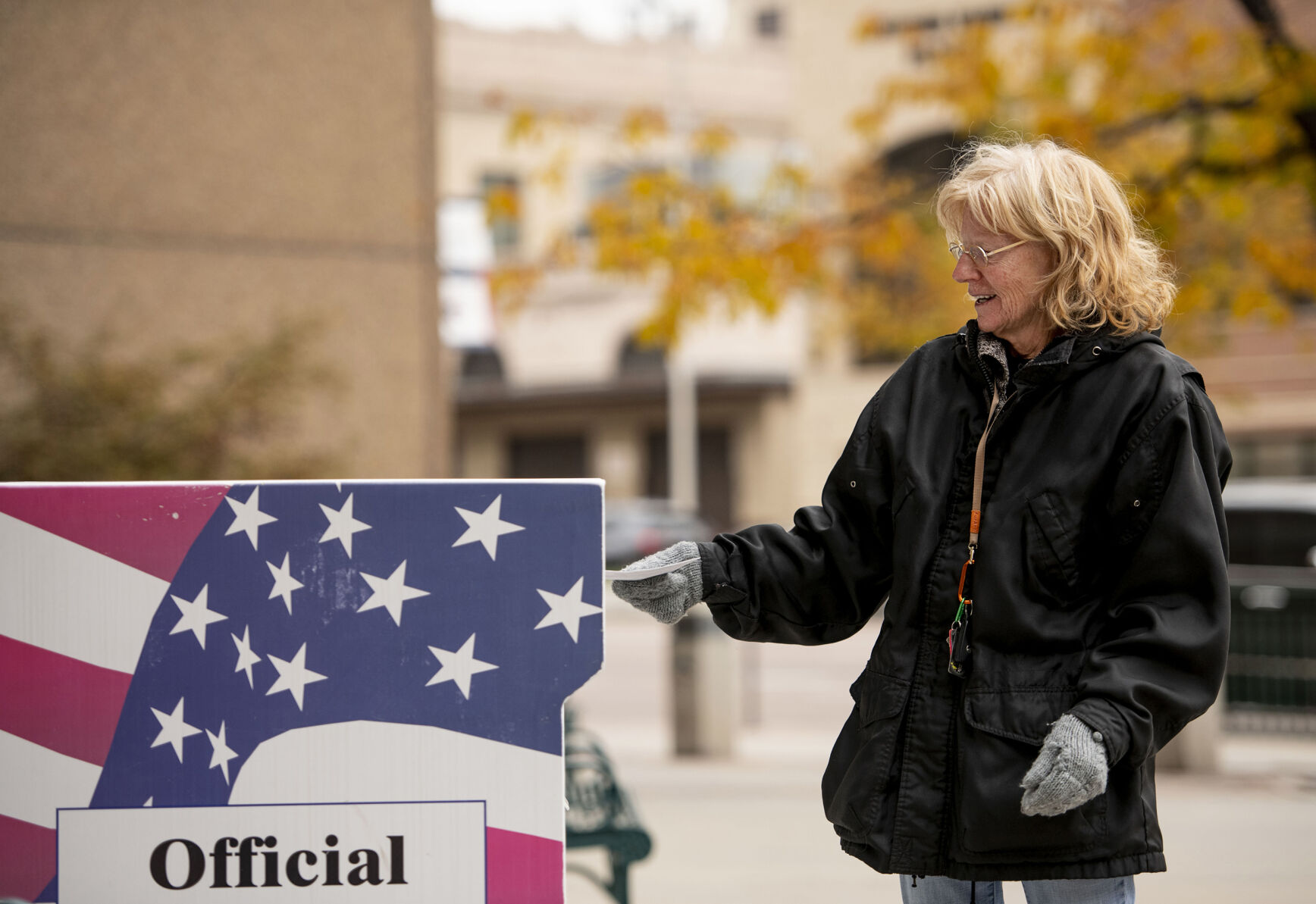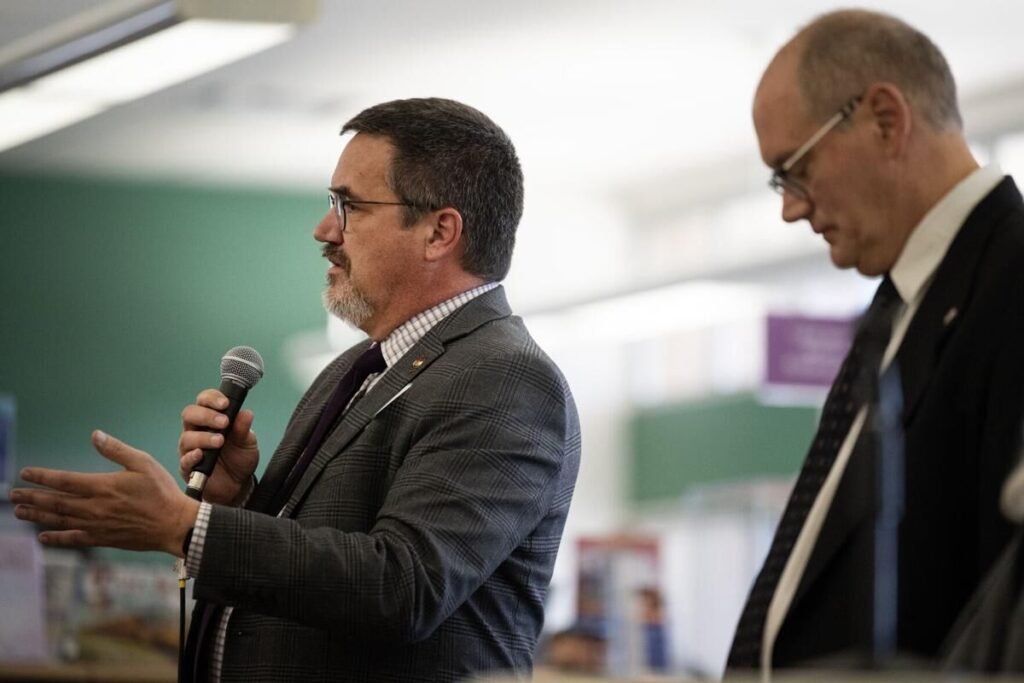A software glitch? A fake candidate? Judge weighs unusual facts of campaign finance lawsuit

A federal judge is considering whether to block Colorado’s constitutionally-embedded campaign spending limits from being enforced against a single Republican candidate, little over one week before the 2022 election.
While the outcome may hinge on a pair of legal doctrines without much reliance on the facts of the case, the circumstances are nevertheless unusual. After a seven-hour hearing before U.S. District Court Judge Nina Y. Wang on Friday, there was no definitive explanation for why Paul Archer, who is running to represent House District 37 in the south metro area, became subject to the state’s voluntary spending limits in the first place.
The testimony led to an even stranger question: Was the state’s electronic system for tracking and reporting campaign spending actually responsible for a pair of unheard-of glitches that created a phantom candidate, changed Archer’s responses, and otherwise affected a competitive Arapahoe County race?
In the government’s view, the answer was no. The Colorado Attorney General’s Office claimed Archer alone inadvertently opted himself in to the spending limits, and then created a fictitious candidate who could give him an escape hatch to spend freely. Archer found out months ago that he was subject to the voluntary spending limit, the state’s lawyers pointed out, but only waited until voting had begun to ask a judge to intervene.
“Mr. Archer demands rigor, professionalism and attention from detail from those he deals with, including at the secretary of state’s office. But he doesn’t hold himself to the same standard,” argued Assistant Solicitor General Grant T. Sullivan.
Archer, on the other hand, countered that any decision to give up his First Amendment right to spend freely on his campaign had to occur knowingly and voluntarily. Whatever happened when he registered his candidacy did not amount to a proper relinquishment of his rights.
“A candidate has to endure plenty of slings and arrows. But one of the things that is pretty clear in the case law is that a candidate can withdraw or can waive constitutional rights, but that waiver has to be knowing,” said Archer’s lawyer, Scott Gessler. “He did not voluntarily waive the campaign spending limits. He testified he did not click the box.”
Wang will now decide whether to issue a preliminary injunction that would block Secretary of State Jena Griswold’s office from enforcing the spending limitation against Archer in the closing days of the election. She raised the question – potentially key to her analysis – about what Archer knew when he submitted his candidate registration with the voluntary spending limit box apparently checked off.
“You’re not making a challenge to the limitation as it exists,” Wang told Gessler. “Your argument is: If he didn’t knowingly and voluntarily waive that right, his First Amendment rights have been violated because he did not agree to those limits.”
Correct, responded Gessler.
Discovering the error
Archer, a business owner from Centennial, filed his online affidavit in February announcing his intent to be a candidate for HD37. There is no incumbent for the seat and Archer’s Democratic opponent is Ruby Dickson. She declined to comment to Colorado Politics about Archer’s lawsuit.
The affidavit for Archer, dated Feb. 24, indicated he was accepting the voluntary spending limit for his campaign. Under the Colorado constitution, candidates for the House of Representatives can accept contributions of $200 per donor for the primary and the general elections – up to $400 total. Alternately, candidates may volunteer to impose a spending limit on themselves in exchange for being able to collect twice that amount per donor, or $800 in an election cycle. This year, state House candidates would agree to spend no more than $88,225 total.
The decision to limit one’s spending, according to the constitution, “shall be irrevocable,” but candidates are permitted to reconsider if other people join the race and decline to limit their own spending.
On June 29, Archer participated in a video call with Garrick Frunz, an employee at the secretary of state’s office. Although the purpose of the call was to discuss an unrelated campaign contribution issue, Frunz observed Archer had accepted the voluntary spending limit. Both men had the same recollection about Archer’s reaction.
“Mostly surprise,” Frunz testified in court.
“I told him I didn’t make that choice and we need to reverse that,” Archer added.
Andy Archer, the candidate’s son, also participated in the call. Frunz testified the Archers wondered if there was an opportunity to withdraw from the voluntary spending limits.
“We just need somebody else to enter the race and that would trigger the opportunity for him to withdraw his acceptance,” Andy allegedly said. Frunz said he cautioned against any tactics involving a non-legitimate candidate.
Frunz and Paul Archer exchanged roughly 14 emails until Aug. 12, when Frunz finally informed the candidate the secretary of state’s office decided Archer was ineligible to revoke his acceptance of voluntary spending limits.
In response, Archer challenged the secretary of state’s entire process for obtaining candidate affidavits. Even if he “inadvertently clicked a button on a website,” the constitution still required the forms to be notarized, he pointed out. The secretary of state’s office deviated from that requirement in 2012 when it required candidates to file their affidavits online. The Republican secretary of state at the time who signed off on the change was Scott Gessler – Archer’s current attorney.
“This requirement is clearly stated in the Constitutional Amendment on election finance,” Archer wrote in an Aug. 19 email. “Inasmuch as you did not fulfill your obligation, why am I being unfairly treated?”
The mysterious candidate
On Sept. 2, the secretary of state’s office received an affidavit for a new HD37 candidate, “Ammon Ray Jones,” running with the Unity Party. Jones’ entry triggered a 10-day window in which Archer, the only candidate subject to voluntary spending limits, could revoke his acceptance of them.
However, when the office sent a confirmation to the email address listed on the affidavit, the recipient, Ammon Franklin, responded that he had “no clue why I received this email. My name is not Ammon Jones.” He also alerted the office that the mailing address used on the affidavit was similar to his work address, calling it “disturbing.”
The day after Franklin’s reply, Archer filed his lawsuit.
“You and Mr. Archer are friends, is that right?” Assistant Attorney General Peter G. Baumann asked Franklin on the witness stand.
“That’s correct,” responded Franklin, who said he had never to his knowledge visited TRACER, the state’s online campaign finance system. “We met perhaps eight years ago at church.”
Archer admitted he had entered the name “Ammon Jones” into TRACER, which also generates candidate affidavits. He did so because he wanted to see the “rigor involved in the process” of registering a candidacy. Archer insisted he had never clicked the submit button.
“I filled out the name, created an address just out of my head, and recall creating an email address that was a fictional email address,” Archer said. “I had no intention of defrauding the system.”
“You say you created an address out of your head, 123 Fake St. or something like that?” Baumann pressed Archer.
Archer acknowledged he used an address down the street from where he worked, that he knew would be in HD37. That address, coincidentally, was near Franklin’s actual work address. It was unclear why the confirmation email went to Franklin’s real inbox if, as Archer testified, he had created a fictitious email.
The government’s theory was that Archer purposefully planned to create a fictitious candidate, as his son had allegedly suggested, but got “cold feet.”
Complicating matters, testimony also revealed the secretary of state’s office has, on limited occasions, permitted candidates to change their financing status without the entry of another candidate. Suzanne Taheri, a former deputy secretary of state and the chair of the Arapahoe County GOP, recalled an attorney general candidate from 2018 asking to withdraw his acceptance of voluntary spending limits, claiming, as Archer did, that it was a mistake.
That candidate was “a trained lawyer, running for major statewide public office” when he made the mistake, Taheri noted.
And yet, Sullivan pointed out, the candidate had contacted the secretary of state’s office three weeks after inadvertently accepting the voluntary spending limits – not multiple months, as in Archer’s case.
A rare glitch or a mistaken click?
Archer’s lawsuit is not the first this year to challenge Colorado’s framework of donation caps and spending limits. In March, a federal judge declined to grant a preliminary injunction on behalf of multiple Republican candidates, who argued the amounts permitted by law were so low as to violate the First Amendment.
His claim, however, takes aim solely at the secretary of state’s application of the spending limits to Archer’s campaign. He argued the office may not impose spending limits on candidates without their voluntary agreement, before a notary public, to abide by the caps. The use of an online form, adopted during Gessler’s term in office, also allegedly runs counter to the state constitution.
Consequently, Archer’s preliminary injunction request seeks immediate relief from the voluntary spending limits, citing “irreparable harm.”
The revelation that he had signed up for spending caps “significantly handicapped my campaign. I had much more robust plans. My opponent has raised well over $88,000 and I have ‘dark money’ dumping on me like crazy,” Archer testified. “We financially planned for late-in-the-game responses. But the voluntary spending limits have handicapped my ability to do that.”
The government countered that multiple legal doctrines preclude him from a last-minute, favorable court ruling. First, the attorney general’s office argued Archer had unreasonably delayed his request, filing a motion for a preliminary injunction two days after county clerks began mailing ballots this month despite knowing about the problem since June. Second, the state cited the “Purcell principle,” which deters court-ordered changes to state election rules so close to the voting period.
Even if those mechanisms did not doom Archer’s request, the government contended he was unlikely to succeed on the merits of his underlying lawsuit. Testimony from Stephen Bouey, a 13-year veteran of the secretary of state’s office, cast doubt on whether the TRACER system had, on its own, opted Archer in to voluntary spending limits and submitted the false candidate affidavit for Ammon Jones.
“Have you ever seen a TRACER glitch where TRACER clicked a button for someone?” Baumann asked.
“Where the system submitted a document that was not intended to be submitted? No,” Bouey responded. “This is the first instance of somebody saying they did not click a button and yet the system did something.”
The attorney general’s office also noted that Archer’s financial reports revealed four donations of $800 each from friends and family – amounts that were only valid for candidates who choose to voluntarily limit their spending. Archer responded that those donations were intended to be split up into $400 increments because they were mostly the donations of two spouses, and the larger dollar figures were merely a clerical error.
But the government disputed that evidence, claiming Archer should not be able to excuse himself from the voluntary spending limits framework while simultaneously benefitting from larger donations. Because the public had seen since February that Archer was voluntarily limiting his spending, Sullivan argued it would be wrong to change the rules for him while voting was underway.
“People routinely review things quickly, click things that seem right at the time, but do so without fully understanding what they are agreeing to,” Sullivan said. “That is what happened here. There was no technical glitch with TRACER. Mr. Archer did click the box without understanding.”
The case is Archer et al. v. Griswold.














